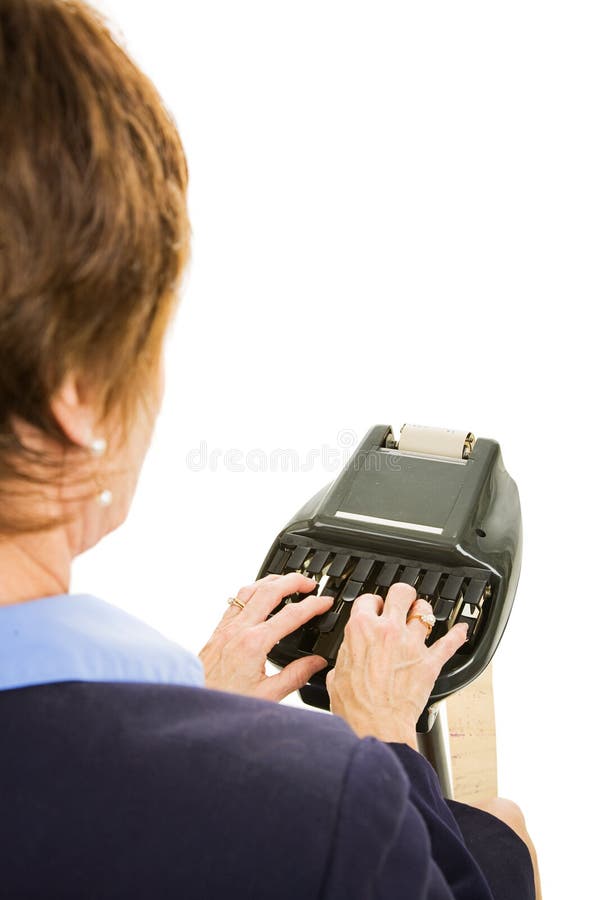Court Typist vs. Stenographer: Breaking Down the Key Differences
Discover the Necessary Skills and Responsibilities of a Court Typist in Today's Lawful Landscape
As a court typist, you hold a vital position in the legal system. Your skills exceed just keying; they involve understanding complicated legal terms and procedures while making certain precision in every document. You collaborate closely with attorneys and judges, making your role important for effective interaction. What particular abilities do you need, and exactly how can you adapt to the ever-evolving technical landscape? Let's discover this further.
The Duty of a Court Typist in the Judicial System
As the foundation of the judicial system, a court typist plays an important function in assuring that lawful proceedings are properly recorded. You are in charge of recording everything from witness statements to courts' judgments, capturing every detail with precision. Your work assists maintain a clear and permanent document of court tasks, which is critical for future referral and appeals.In the courtroom, you're frequently the unrecognized hero, silently assuring that all talked words end up being created documents. You keep privacy, understanding the sensitive nature of legal issues. You additionally team up closely with legal representatives, staffs, and judges to assure the smooth circulation of details. By working effectively under pressure, you add to the total efficiency of the judicial procedure. Your attention to detail and commitment to precision not just promote the stability of the court but also sustain the wider search of justice in culture.
Crucial Skills Required for Court Typists
Court typists need an unique blend of abilities to excel in their important role within the judicial system. Most importantly, you must have exceptional typing abilities, frequently achieving rates of 70 words per min or more. Precision is critical; even a small mistake can lead to substantial misconceptions in legal files. You'll likewise need strong attention to detail, guaranteeing every word is recorded correctly.Additionally, great business skills are essential for handling multiple situations and papers effectively. Being tech-savvy is vital, as you'll make use of various software application programs for word handling and record monitoring. Solid interaction abilities help you communicate with courts, lawyers, and various other court personnel effectively.Lastly, a sense of professionalism and trust and confidentiality is a must, as you'll take care of sensitive details daily. By honing these abilities, you'll be well-prepared to add significantly to the courtroom atmosphere.
Understanding Legal Terms and Procedures
As a court typist, you need to realize key legal terms and treatments to execute your work effectively. Comprehending these concepts not just helps you transcribe properly however also guarantees you can follow the flow of court process. Allow's explore the important legal vocabulary and a review of court procedures you should understand.

Secret Legal Terms
Recognizing key legal terms is essential for any person operating in a court environment. You'll frequently come across terms like "plaintiff," which refers to the individual launching a claim, and "defendant," who replies to the accusations. Knowing the distinction between "civil" and "criminal" situations aids you grasp the context of the proceedings. Experience with "subpoena" assurances you recognize the lawful documents engaging witnesses to testify. In addition, terms like "proof" and "statement" are important, as they relate straight to the info provided in court. Mastering these terms not only improves your efficiency as a court typist however also assures that you add to the precision and clearness of lawful documents. Your role hinges on exact terms, so don't take it gently!
Court Procedures Summary
Knowledge with key lawful terms establishes the phase for comprehending court treatments. Comprehending how a court features is important for any kind of court typist. You'll come across procedures like arraignments, where accuseds hear charges, and activities, which are demands for a court judgment. Acquaint yourself with the roles of courts, clerks, and lawyers, as each plays an important part in process. Knowing the circulation of a test-- from court choice to closing debates-- aids you properly catch the proceedings - court typist. Additionally, comprehending the importance of maintaining a neutral and exact document can not be overemphasized. By mastering these elements, you'll enhance your effectiveness in recording necessary court activities and add substantially to the lawful process. Your function is vital in preserving the stability of court documents
The Effect of Technology on Court Typing
Modern technology's transformed court keying in considerable methods. With digital transcription devices, you can raise performance and accuracy, making your task much easier than ever before. And also, remote court procedures have altered how you approach your job, requiring versatility to brand-new layouts and innovations.
Digital Transcription Tools
As digital transcription devices continue to advance, they're changing the way court typists perform their duties. These devices improve the transcription procedure, allowing you to record talked words properly and successfully. With voice recognition software application, you can transcribe real-time process, lowering hand-operated input and minimizing errors.Moreover, cloud-based systems make it possible for very easy access to documents, so you can work collaboratively with lawful groups and assure everybody's on the exact same page. Automated formatting attributes conserve you time on repeated jobs, allowing you concentrate on material quality.Additionally, electronic tools improve safety, safeguarding delicate details via encrypted storage space and controlled gain access to. By welcoming these innovations, you can boost your efficiency and keep the high criteria needed in the lawful field.
Remote Court Procedures
The increase of remote court proceedings has significantly transformed the landscape for court typists. You currently depend on technology to capture and record online hearings from your home or office. Experience with video conferencing platforms is essential, as you'll require to navigate them effortlessly to guarantee a precise document. You'll additionally need to manage audio quality, as background noise or connection concerns can interrupt your job. Additionally, remote process demand fast thinking; you may need to clarify statements or demand repeats in real-time. Remaining organized and reliable is vital, as due dates remain tight. Welcoming these technical developments not only boosts your abilities however also ensures you continue to be a vital asset in today's evolving legal environment.
Precision and Attention to Information in Transcription
Precision and attention to detail are crucial in transcription, particularly for court typists. court typist. When you're transcribing legal proceedings, every word counts. A single mistake can change the meaning of a statement, potentially impacting the end result of a situation. You should listen thoroughly, ensuring that you record every subtlety and inflection in the audio speaker's voice.Your capacity to catch typos and grammatical errors is important. You do not just type; you confirm that the final paper is a precise depiction of what was stated in court. This requires an eager eye and a detailed understanding of lawful terminology.Moreover, you'll need to be acquainted with different accents and talking styles, as court rooms can host a variety of speakers. By refining your a knockout post accuracy and attention to detail, you'll maintain the integrity of legal papers and contribute significantly to the judicial process. Your persistance in this field really makes a distinction

Time Management and Business Abilities
While taking care of several tasks, efficient time management and business abilities are crucial for court typists. You'll often handle different deadlines, from recording court process to preparing lawful papers. Prioritizing your workload is essential; recognize urgent jobs and tackle them first to ensure timely submissions.Organizational skills come right into play when you're sorting through situation notes, transcripts, and documents. Keeping every little his comment is here thing nicely classified not just conserves time but additionally reduces the risk of mistake. Utilizing devices like calendars, to-do lists, or specialized software application can help you remain on track and handle your time effectively.Moreover, establishing particular objectives for each work session can improve your efficiency. Damage larger projects into smaller jobs to make them extra workable. By refining these skills, you'll not only enhance your effectiveness but additionally contribute significantly to the smooth procedure of the lawful process, assuring everything runs like clockwork.
Continuing Education and Expert Development Opportunities
Purchasing your abilities does not stop with time monitoring and organization. As a court typist, you'll find that continuing education and learning and specialist growth are necessary to remaining competitive in the lawful field. Try to find workshops or on-line courses concentrating on advanced inputting techniques, legal terminology, and transcription software program. These can develop your abilities and aid you adjust to the current technologies.Networking is similarly crucial. Sign up with specialist companies like the National Court Reporters Organization (NCRA) or local legal organizations. They often provide resources, training sessions, and conferences that can enhance your understanding and link you with peers.Don' t neglect concerning certification programs that can increase your reputation and bankability. Remaining updated with the most recent trends and ideal techniques in lawful documentation will improve your effectiveness and accuracy, making you an important property to any kind of legal team. Invest in your development, and you'll enjoy the benefits throughout your profession.
Frequently Asked Concerns
What Is the Normal Income Array for a Court Typist?
A court typist's normal income varieties from $30,000 to $55,000 yearly, depending on experience and place. You might likewise find possibilities for growth with additional skills, causing raised pay in the legal field.
:max_bytes(150000):strip_icc()/court-reporter-525667-edit-49284a4fd8514a41931e516429a6c045.jpg)
Are Court Typists Required to Have a Legal Degree?
Court typists don't require a lawful degree, but having one can be useful. You'll frequently discover that strong typing abilities and expertise of legal terms are more vital for success in this duty.
What Are the Work Hours for a Court Typist?

Exactly How Do Court Typists Make Sure Privacy in Their Job?
You ensure privacy by safely dealing with delicate documents, using encrypted software, continue reading this and following rigorous protocols. You stay familiar with privacy regulations and only share details with accredited employees, preserving count on the judicial process.
Can Court Typists Job From Another Location or Freelance?
Yes, you can work remotely or freelance as a court typist, specifically if you have reliable technology and a secure environment. Several lawful specialists now embrace remote job, using versatility and opportunities for independent typists. As the backbone of the judicial system, a court typist plays an important duty in ensuring that legal procedures are accurately recorded. As a court typist, you need to grasp crucial legal terms and treatments to do your job properly. Understanding these terms not only improves your efficiency as a court typist but also ensures that you add to the accuracy and quality of lawful records. The increase of remote court process has greatly changed the landscape for court typists. As a court typist, you'll find that continuing education and learning and expert growth are necessary to staying affordable in the lawful field.